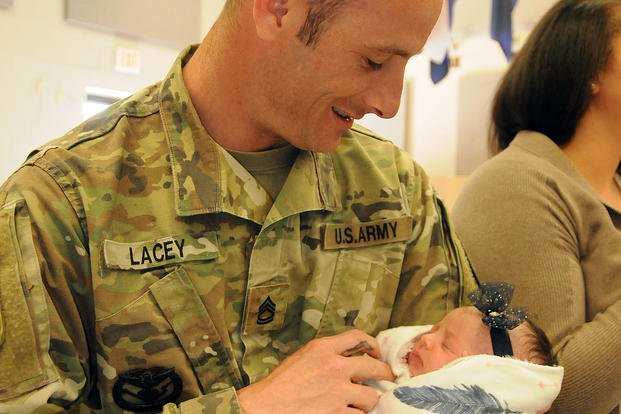The great and not-so-great thing about writing about parenting each week is that I'm forced to continually assess the sort of parenting my own military children receive.
Perhaps fashion and beauty writers are similarly both addicted to (and repulsed by) full-length mirrors. Film writers rarely step outside. And sex writers, well ... they're probably a lot of fun to date.
Or not.
Obsessing over parenting is great because I believe there is always room for improvement. But it's not-so-great, because -- like most parents -- I'm plagued by the idea that my Army husband and I might be screwing up our kids.
One of the biggest, if not the biggest, challenges I face as a Must-Have Parent is figuring out where my husband fits into our parenting portrait.
There have been dozens of studies over the years that confirm that kids and marriages benefit when parents share parenting and household duties.
And dozens of studies confirm that not having both parents involved in children's lives is linked to a multitude of negative outcomes in children.
There are even studies that show that, because of the nature of men, spending time specifically with a loving father provides children with guidance that a mother just can't provide.
I write about this stuff, so I read these studies. I know that 1) my marriage and my children are much more likely to thrive when my husband is involved; and 2) my family is at risk for negative outcomes when he isn't.
And that's great to know.
But I also know that there are many times when he simply can't be involved. Not because he doesn't want to be, not because he doesn't care, not because he's selfish or a workaholic -- but because due to his commitment to the military he Just. Isn't. Home.
And, because I always manage to figure out ways to do this parenting thing without him (it's been almost 10 years and as many deployments now and none of my kids are dead or permanently injured, we've had no house fires or major floods, and even the dog is still alive, so I must be doing OK), it's hard for me to figure out how to parent with him when he's home.
Instead, I find myself guarding my turf. I get frustrated when he does something "wrong" (which generally means he does it differently than I would). I resist his ideas. In short, I push him away from parenting.
So, oddly enough, I was a bit comforted and felt incredibly validated when I stumbled across this study, which found that conflict does, in fact, increase when parents share in the caregiving duties.
It seems counter-intuitive, doesn't it? As MHPs, we often find ourselves wishing that we had more help, so why would conflict increase when that help arrives? And yet it does.
The solution to this problem, though, seems pretty darn simple: Don't try to divvy up caregiving duties. There's more to parenting than caregiving, and parenting isn't supposed to be only about work.
Crazy, right? But I read about those families who split every single thing right down the middle, I know that this is not us, MHPs. This can't be us. And these strategies for "equally shared parenting" will not work for us.
Our families are more like this one. And that is totally fine. Growing up in a family like ours will not screw up our kids, provided we work wisely with the situation we've got.
What reading all these studies tells me is that what my kids need most from my husband, the Must-Do parent, is fun. Not coincidentally, he could probably use a little more fun himself at the end of the day. They need to wrestle with him. They need him to toss them up in the air and chase them around like a monster. They need to play with him.
So it's perfectly fine if he and I don't split parenting duties 50/50. Maybe that seems unfair, but who wants a fair house when you can have a happy one?
Keep Up with the Ins and Outs of Military Life
For the latest military news and tips on military family benefits and more, subscribe to Military.com and have the information you need delivered directly to your inbox.





















